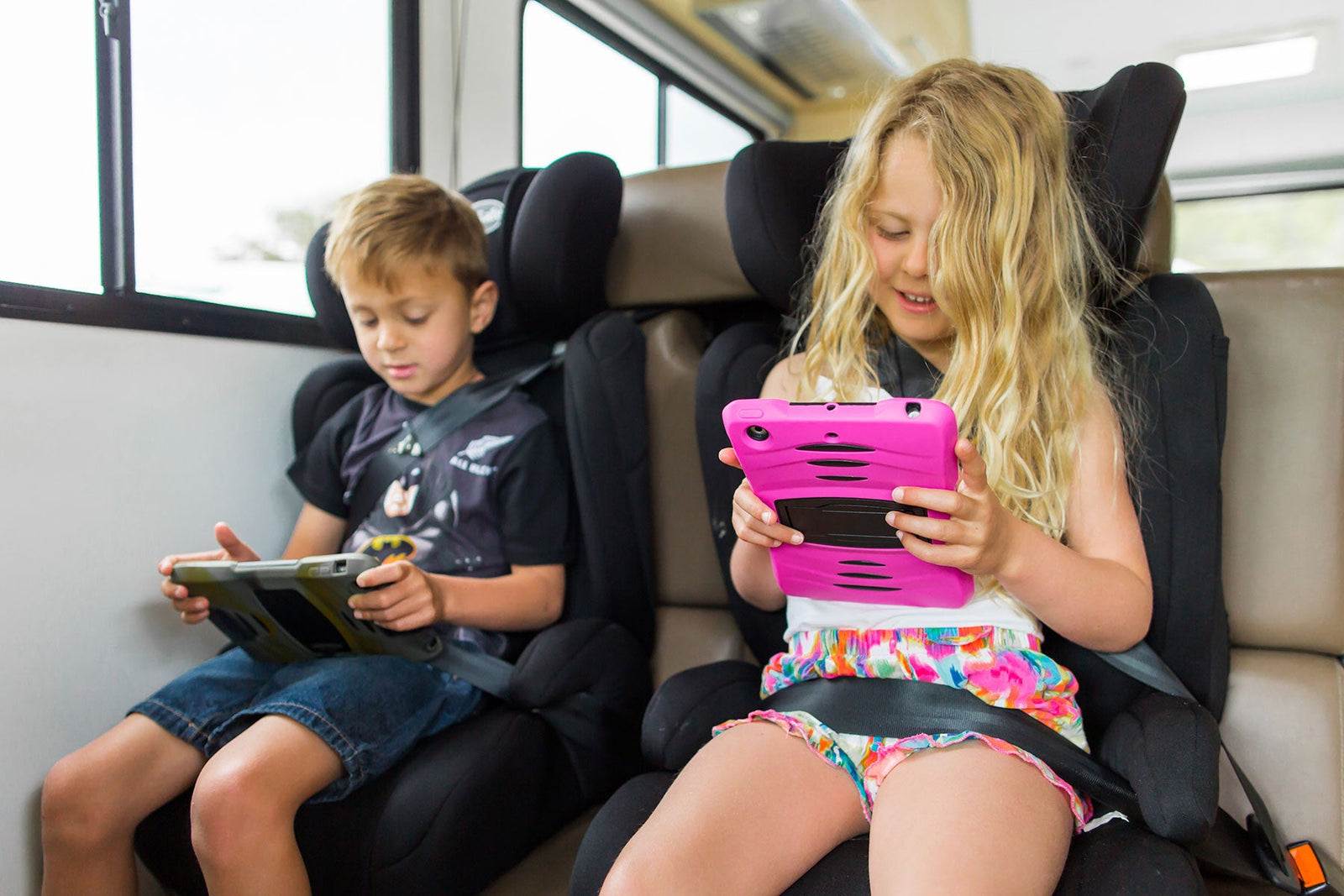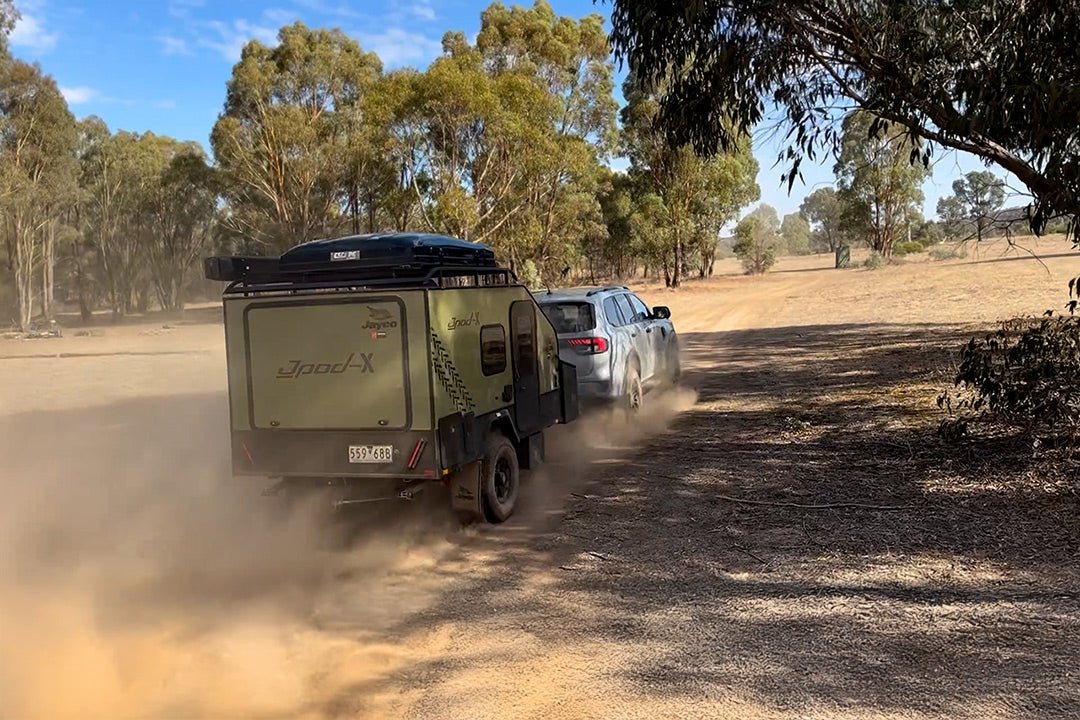Homeschooling On The Road

You’ve installed extra water and fuel storage on your rig, planned your route, pored over the best rest stops and scenic campsites, and you’re ready to take off with the family on a Big Lap to explore all the country has to offer.
There’s just one hitch – what will you do about your children’s education while you’re on the road?
There’s no doubt that travelling is a wonderful educational opportunity for the whole family, but what if you’re planning an extended trip and your children are still in school? Depending on their ages, parents would generally have to be the full-time teacher – and that’s a responsibility some may not feel confident taking on.
But never fear. There are plenty of options and educational resources available to parents travelling with children and here we look at some of the best ones so you can find one that works for you.
Educating on the road
There are three main educational options available for children who are heading off on an extended road trip with family. You can maintain enrolment at their current school, take part in distance education or homeschool on the road. Here’s what each means.
Maintain enrolment
If you choose to keep your child enrolled in their existing school, in a nutshell, the school provides enough work for the student to complete while on the road. This one can be tricky though, as some schools don’t allow (or state legislation doesn’t) extended periods of absence. If you think this option may work for you, check in with your current principal and see what’s possible – in legal terms too – without compromising your child’s educational development.
Distance education
If you’re heading off on a big lap and won’t have reliable mobile or internet reception (and let’s face it, you probably won’t), this one might not work for you. Generally speaking, distance education is when your child attends daily classes remotely, presented by a distance educator. Now we know how much kids enjoyed that during COVID, so this option might be a last resort for some families. Also, you’ll need to know exactly where you’ll be at any given time to receive packages of educational resources. Students generally have to stick to a schedule and parents or carers are responsible for making sure the schoolwork gets done. While it does come with challenges – you simply can’t predict what will happen on the road – you are provided with all the resources you’ll need, you don’t need to get a homeschooling program approved and you will get access to teachers, should you need it.
Homeschooling
Arguably the best educational option for longer roadtrips, homeschooling gives everyone flexibility and doesn’t get in the way of family adventures. Data from a recent survey shows that homeschooling is on the rise across Australia, with 21,437 students registered in 2019. The Home School Legal Defense Association says that’s an increase of 105 per cent over the past eight years, with an annual growth rate of 9.4 per cent.
One of the main benefits of homeschooling is that learning schedules can be adapted to suit the student – and your itinerary. You do need to register a homeschooling program so pay close attention to the legal requirements of your home state.

Kids can also join educational groups on the road (Image Tourism and Events Queensland)
Planning to suceed
Before you start planning to homeschool, do yourself a favour and sign up to one of the many workshops on the Australian Homeschooling Summit. They have more than 120 online workshops for parents hosted by those who have been there or assist those who have. Workshops cover every topic you’ll need to be across from registration, reporting, subjects, organisation and everything in between, and you can always refer back to the tutorials if you need to.
There’s also an increasing number of reputable homeschool learning providers available throughout Australia, and a quick online search will bring up dozens. Most of these organisations offer pre-planned, self-paced homeschool programs so much of the hard work such as planning lessons that adhere to your state’s curriculum is done for you, or you can cater the program to your own needs and take a more hands-on approach. These organisations can also help with the at times complicated registration process and can give parents peace of mind knowing their child’s learning is in line with their peers and that they won’t fall behind.
While you definitely don’t have to sign up to one of these provider organisations to legally homeschool, it definitely can make your life easier – but it does come with a price. While organising homeschooling on your own might seem daunting, there are hundreds of workshops and tutorials to help get your started and create the best on-the-road learning plan for your child.
Homeschool learning plan
While homeschooling is legal in all states of Australia, you’ll need to write a homeschooling learning plan to submit with your registration application.
If you prefer to keep it simple – and fairly flexible – choose Australian curriculum-approved resources for core subjects, and then supplement them with learning around activities and visits to sights and attractions while you’re on the road. The school your child is currently enrolled in may also be able to help with resources, which is particularly useful if they’ll return to that same school after your travels. Most states will require that the program addresses their curriculum, and there is some necessary albeit infrequent reporting. Track down homeschooling support groups in your area or online – Facebook is a great place to start – as they can usually provide registration tips and help you make sure you’re putting together the best application, and learning plan, that you can. Again, the registration process requires you to adhere to the legal requirements of your state, and they can frequently change, so make sure you check them carefully before you go ahead and write your plan.

Homeschooling helps broaden kids' horizons; Learning on the road can be a very natural learning experience (Images Tourism and Events Queensland)
Seek out the experts
Everyone’s homeschooling journey will be very different, depending on individual circumstances, willingness to embrace the concept and how well your family adapts to life on the road.
The one thing you can’t do enough of when planning to homeschool on the road is prepare.
Homeschooling expert Beverley Paine has written several books about homeschooling and has an awesome range of parent resource directories available to would-be homeschoolers. These resources are available on her site, The Educating Parent, and she also is a strong advocate for finding groups in your area to provide support and guidance.
There are hundreds of support groups online, most are on Facebook, which welcome those planning short-term holidays with kids, long-term lappers, school holiday road trips or even those who are planning lengthy overseas family holidays.
Beverley, who is a voluntary home education advocate, officially began home educating her children in 1985, and is a passionate supporter of the flexibility and depth of learning that homeschooling provides.
“I began questioning how schools could do better when I was a young teenager, but it wasn’t until my eldest child was about to turn five that we came across the idea of home education,” Beverley says.
“We’d been actively engaged as coordinators for playgroups and volunteered at the local kindergarten and our desire was to continue having this kind of hands-on involvement in her education. The local school could only offer volunteer positions helping in the canteen and school grounds; we wanted to help in the classroom the same way we had with kindy.”
Beverley homeschooled her three children from 1985 to 2004 and says homeschooling is a great option for families who want to go on extended road trips, or even overseas trips and doesn’t believe the standard of education on the road is compromised.
“[On the road there are] incredible opportunities to learn about different places and the people that inhabit them [both now and in the past]; meeting different people doing different things, having first-hand experience of this diversity.
“With information technology it’s easy to explore and discover in-depth while on the road, as well as the opportunity to document experiences and learning in different ways. It is not hard to find resources to match children’s learning needs now, wherever you are.”
Her website lists the resources available to parents and students, as well as a range of national resources.
She says finding a great support group is invaluable.
“[They’re] incredibly important for parents who seek and need reassurance from experienced home educators, as well as tips and information about methods, approaches and resources” she says.
“Children enjoy getting together with other kids, largely for social interaction, excursions, camps, and regular shared activities.”

Kids can create treasured experiences and relationships when learning on the road (Image Tourism Australia)
Beverley says the benefits of homeschooling include:
- Broadening of one’s horizons
- Getting out of your comfort zone
- Experiencing different things
- Learning about different cultures
- Naturally learning about history and geography
- Building resilience by having a go and exploring and discovering
She says a potential drawback of homeschooling on an extended road trip could be financial.
“Finances can be an issue – travelling can be expensive. Those who live this way permanently find that they stop longer and hence build relationships with people and places, ones that they treasure for many years,” she says.
“They have learned to live frugally. For those doing ‘the lap’ over three to 12 months often have prepared a budget for travelling. Educationally I can’t see any drawbacks. Kids who have been withdrawn from school for the purpose of travelling usually catch up in those areas they haven’t covered fairly quickly, and are naturally ahead in other areas.”

Learning cultures along the way is a benefit of homeschooling (Image Tourism NT)
Registering to homeschool
The registration process differs from state to state, but here is where you can find applications and resources to apply in each state and territory. Some applications will be followed up with phone calls, in-person or home visits. Some require you to follow that state or territory’s curriculum and others have various stipulations that need to be followed. Each is different so make sure you carefully check your state’s respective site for what needs to be completed to avoid delays and potential rejection. The approvals process can take from 28 days up to 12 weeks, so apply in plenty of time prior to your trip. Thanks to Fearless Homeschool for providing comprehensive listings and requirements of the registration process. You can see more information here.
To register with the VRQA, you’ll need an application form, ID and completed learning plans for each child aged between six and 17.
In NSW, head to the NSW Education Standards Authority, and fill out an application for each child. You’ll need a learning plan that complies with the NSW curriculum and will have a follow-up meeting with them to assess your situation.
There isn’t a lot of information about homeschooling in this territory readily available. At present, you can register to homeschool by filling out an application and providing ID.
Register each child with the Home Education Unit. You will need to submit the application form, your plan of education for the year, identification, and a statutory declaration.
The NT accepts homeschool applications for limited periods only, for children ages six to 17. You need an application form, weekly learning and teaching plans, plus ID.
In WA, you can register to homeschool with the Department of Education. You need to lodge an application with your nearest regional education office, and within three months, you’ll have a meeting with a home education moderator. You don’t have to have created a formal learning plan, but you do need to show how you will provide education.
Here you don’t need to register to homeschool but rather enrol your child aged between six and 17 at a regular school and apply for an attendance exemption. You must have a suitable program that meets the Australian Curriculum standards (or similar) and provide the resources and environment for healthy learning.
Head to the Office of the Education Registrar website to register, and part-time homeschool registration is also allowed. You need to complete an application form for each child aged five to 18, complete the HESP (Home Education Summary and Program) and then be available for a follow-up visit from a registration office.
THE NEXT STEP
If you need help choosing your first caravan or are considering upgrading your existing one, check out the caravans available on TradeRVs today.
The sellers will be happy to help and answer any inquiries you may have about the products advertised for sale.
RELATED ARTICLES:
How to: Distance Education for Kids on the Road
Why You Should Travel with Kids Long-Term







